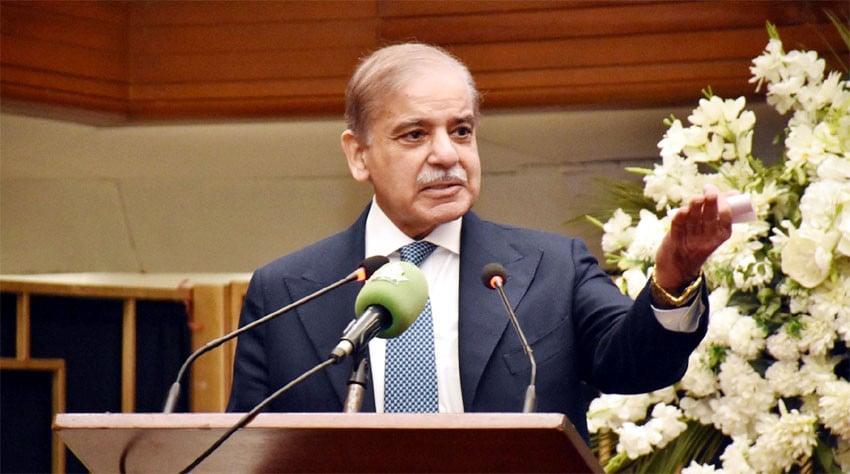Prime Minister Shehbaz Sharif said on Wednesday that peace talks between Pakistan and India could take place in Saudi Arabia or the United Arab Emirates (water), the United States acting as a key mediator.
Addressing Islamabad journalists, the Prime Minister firmly declared that Pakistan had not asked for a cease-fire during the recent conflict. “If we had done, the international community would have known,” he said.
He added that an agreement had been concluded during the communications between the Directors General of Military Operations (DGMO) of the two countries that their respective forces would return to pre-war posts.
The Prime Minister confirmed that the Pakistan delegation at talks would include the National Security Advisor and the Director General of Inter-Services Intelligence (ISI).
Recalling the fighting in Pasrur, the Prime Minister said that the Pakistani forces had maintained their land despite heavy losses.
“Our soldiers remained firm and did not withdraw, even when a soldier and eight civilians were martyred in the control point. They fought with the last man and did not give up their post. ”
When asked if the Israeli staff were present in India during the conflict, Shehbaz Sharif said: “There are reports suggesting that the Israelis were in India. Israel provided significant support to India during the war, but despite this, we came out victorious. ”
“The army chief waged war on behalf of all the armed forces. We prayed and fought-and we won,” he added.
Prime Minister Shehbaz told a phone call for the end of the evening of the army chief warning of the imminent Indian assault. “At 2:30 am, he called me angry, saying that India was preparing to strike. I said to him: We have no problem – the answers and move forward. ”
He added: “We have given a powerful response to a country five times our size in economic and defense capacity. India considered himself the region’s police officer – we broke this arrogance. We only fought to defend our homeland, seeking only the pleasure of God. ”
The Prime Minister said that he had publicly offered an investigation into Pahalgam’s attack during a speech to the Kakul Military Academy, declaring that Pakistan had no involvement. “The world has accepted our position and our neutral offer.”
He said India had initiated the conflict and in response Pakistan destroyed six Indian planes, shot down and even targeted the S-400 air defense system. “We could have cut down more planes but exercise a restraint.”
Prime Minister Shehbaz Sharif said Pakistan had fully used Chinese technology during the recent conflict and joked that the country had become a “marketing nation for China” in the world.
He also praised China for holding Pakistan firmly and recognized the strong support received from Turkiye, Saudi Arabia, the United Arab Emirates and Azerbaijan.
Responding to a question about the reasons why the members of the Pakistan Tehreek-E-insaf (PTI) opposition party were not included in foreign delegations, Shehbaz said: “These delegations are missions at the government level. After the comments made by certain PTI figures on Indian television channels, can we take this risk? ”
Pakistan-India Standoff
The last escalation between Pakistan and India began on April 22, when an attack in the pahalgam seaside resort of the Iiojk killed 26 people. India immediately blamed Pakistan for the incident, despite no public evidence.
In response, India has undertaken a series of hostile actions the next day on April 23, including the suspension of the 65-year-old Industry Water Treaty (IWT), canceling visas for Pakistani citizens, closing the border crossing of Wagah-Attari, ordering the closure of the Pakistani High Commissioner in New Delhi and reducing diplomatic staff in the embassies of Pakistan.
Pakistan firmly rejected the accusation, calling it not supported, but has taken reciprocal measures through its National Security Committee (NSC). These include the cessation of trade with India, the closure of the Pakistani airspace to Indian planes and other counters.
Tensions also degenerated in the early hours of May 7, when the missile strikes reached six cities in Punjab and Azad Jammu and Cashmire (AJK), destroying a mosque and killing dozens of civilians, including women, children and the elderly.
In a rapid military response, the armed forces of Pakistan have shot down Indian war planes, including three Rafale planes, widely considered as a key asset of the Indian Air Force. Over the next two days, India launched waves of Israeli manufacturing drones, which were also neutralized by the Pakistani army.
The confrontation was again intensified in the early hours of May 10, when India targeted several Pakistani air bases with missile strikes. In retaliation, Pakistan launched Operation Bunyanum Marsoos, damaging Indian military facilities, including missile storage sites, air bases and other strategic targets.
On Saturday evening, US President Donald Trump announced that a cease-fire had been reached following intense diplomatic efforts overnight. A few minutes later, the agreement was confirmed separately by the Minister of Foreign Affairs of Pakistan Ishaq Dar and the Indian Minister of Foreign Affairs.
But despite the military ceasefire, the war of the stories led.
While Pakistan has publicly credited US President Donald Trump – with China and the Gulf States – for playing an essential role in defusing tensions, India has minimized foreign participation. Indian officials insisted that the truce was the result of direct bilateral talks.
Trump, however, reiterated his position twice after the initial announcement.




